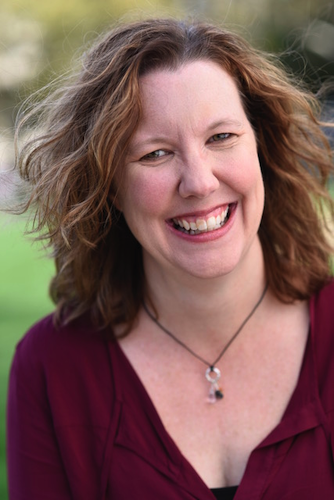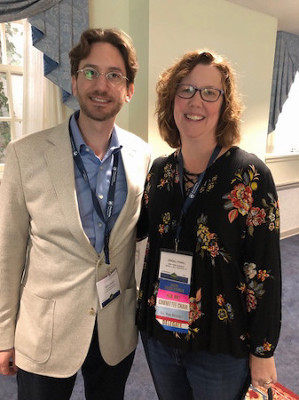Telling Stories of Science
Kendall Powell ’97 brings her curiosity from W&M to science journalism
December 2, 2024
By
Connie G. Ryu ’25
When Kendall Powell ’97 graduated from William & Mary, she did not know science journalism was a field. However, she followed her interests from academia to freelance writing and eventually to her current position as a senior editor for Nature Careers.
Based in Lafayette, Colorado, Powell commissions and edits feature articles and Q&As for an audience of early-career scientists, covering diverse topics from career paths to workplace challenges in science.
“A lot of what we do is service journalism, where we are trying to help people navigate the early-career scientist landscape and what they want to do with their lives,” Powell says.

Powell majored in biology and conducted undergraduate research under professor Paul Heideman for three years, joining his lab as one of his first students. Her project investigated the reproductive timing of fruit bats, analyzing microscope slides of bat reproductive tracts to document their developing embryos. By her senior year, her work was accepted to be published in the Journal of Mammalogy — an uncommon accomplishment in undergraduate research.
With plans to become a professor, Powell went on to pursue a doctorate in biomedical sciences at the University of California San Diego (UCSD). Three years into her Ph.D. program, her advisor introduced her to the American Association for the Advancement of Science (AAAS) Mass Media Science & Engineering Fellowship, a 10-week opportunity that pairs science students with media organizations to learn about science journalism and public communication.
Though Powell had journalism experience in high school, her AAAS fellowship reignited her love for writing and bridged her passion for science with a newfound interest in science journalism. Working for the Los Angeles Times during her fellowship, she published numerous articles and wrote about topics from a nutrition study to the science of altitude training for Olympic athletes. This experience showed her the breadth and variety possible in science journalism, especially in contrast to the tightly focused research required for a doctorate.
“What really appealed to me about science journalism, as opposed to doing Ph.D. research, was that you get to learn about all kinds of different things,” Powell says. “The topics I covered were so broad, and that's very different from what I was doing in my Ph.D., studying two proteins and what they do in the cell, which was very narrow and very deep.”
After completing her fellowship, Powell graduated from UCSD with a master’s degree in biology, rather than a doctorate, and a clear goal to pursue science journalism. She completed the Science Communication Master's Program at the University of California Santa Cruz, interned at Nature, and then spent about 20 years as a freelance writer, publishing in top outlets including the Los Angeles Times, Nature, Science, The Washington Post and Discover magazine.
Now, as a senior editor at Nature Careers, Powell appreciates the collaborations and processes that go into producing a single article. From receiving a good pitch from a writer, she helps to develop the ideas further and to revise multiple rounds of drafts, and she works with the art team at Nature to incorporate photos or graphics that make the feature article a complete package.
“I enjoy the whole process from start to finish,” Powell says. “It’s a real team effort to put out the best product that we can put out. And I really enjoy that teamwork with people both at Nature and the freelance writers who are the real drivers of those pieces.”
Powell particularly values an unofficial series at Nature Careers that she calls the “taboo series,” which sheds light on topics rarely discussed in the workplace. Past pieces have explored challenges such as managing menstruation during field research, navigating menopause and discrimination in science based on body size. Another series she has worked on, “Changemakers in science,” addresses racism in science and highlights individuals who have made efforts to fight it.
“I like writing about the hard things,” Powell explains. “It’s uncomfortable, but we should still talk about them because they’re part of life or because they’re creating a barrier to people being in science. How can those things be addressed, or fixed, or lowered or removed, so that everyone who wants to become a scientist can become a scientist? Answering those questions is a big part of what we do at Nature Careers.”
The need for science journalism feels particularly pressing to Powell given today’s challenges with public trust in science, exemplified by skepticism around vaccines and climate change.
“We should be presenting accurate and accessible, but also engaging, science stories, so that readers can judge for themselves — rather than ‘selling’ them on a story,” Powell says. “That’s what makes, I think, good science journalism difficult, because you have to find that balance of reporting the story accurately, talking to many different people and incorporating all those different perspectives.”
Making complex science accessible to the public can be challenging for science journalists. Powell says her trick is to use plain language and explain concepts as she would to her grandmother.
Another challenge in journalism is the high-pressure environment in which writers and editors risk burnout due to the constant demand for articles without enough time or resources. Powell credits her time at W&M with preparing her for this demanding pace.
Powell says that W&M’s emphasis on a well-rounded, liberal arts education developed her strong critical thinking and written communication skills. Her research experience as an undergraduate also taught her to approach issues with the skepticism essential for both science and journalism.
Beyond academics, Powell was also active in the Wesley Foundation, a campus ministry sponsored by the United Methodist Church. She made close friends and engaged in initiatives like the Appalachian Service Project over spring breaks. This community service, she notes, felt integral to the W&M ethos.

“You don’t just do your work and stay within your own social circles and family circles,” Powell says. “You should be giving back to your community if you’re lucky enough to have the time and resources to do that. That is a lesson I definitely learned at W&M.”
In her career, Powell has unexpectedly crossed paths with other W&M alumni in science journalism. At the 2019 National Association of Science Writers (NASW) meeting, she recalls encountering several fellow W&M alumni, including Matt Shipman ’98, Josh Chamot ’98 and Bethany Brookshire ’04, among others. Powell, Shipman, and Brookshire all also have given back to the NASW community as longtime leadership volunteers for the professional organization.
All three alumni have navigated paths from W&M to different sectors in science journalism. Shipman is an assistant director of research communications at North Carolina State University, while Chamot works as a public affairs specialist for the National Science Foundation. Similar to Powell, Brookshire initially pursued academia, receiving a Ph.D. in pharmacology from Wake Forest University, and she is now a freelance science journalist.
“We were talking about the fact that we all graduated from William & Mary, and none of us have a journalism degree from there,” Powell recalls. “But it’s really a testament to the power of a liberal arts education that we all emerged as lifelong learners who are curious about the world.”
Powell sees this curiosity as a common trait among W&M students and one that has contributed to her own success in science writing.
“Something that I think most William & Mary graduates are known for is that we go out into the world, and we’re still curious,” Powell says. “We’re still lifelong learners. We still want to know how things work. And it really helps as a science journalist, a science writer, to be infinitely curious about things, to keep asking questions and keep pursuing the answers.”